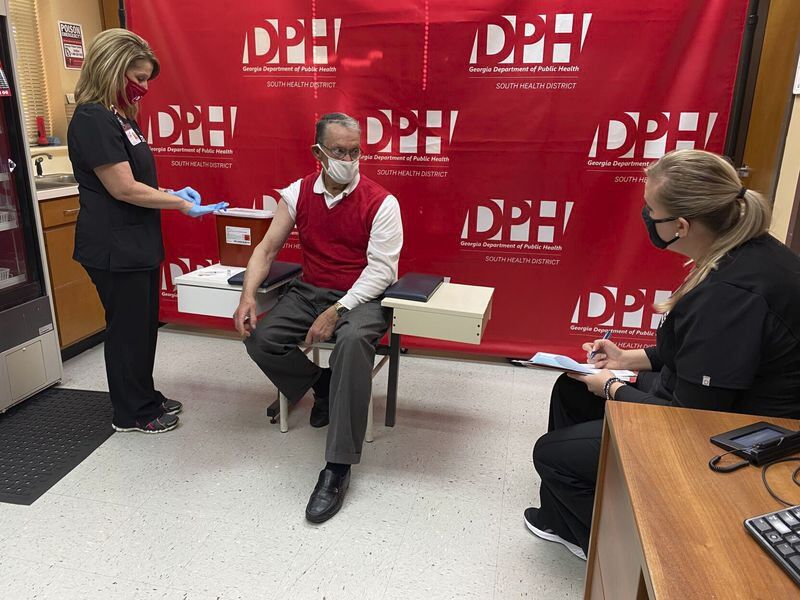Health officials face vaccine reluctance
Published 1:00 pm Friday, March 19, 2021

- File Photo: Bryce Ethridge | The Valdosta Daily TimesDr. William Grow, South Health District director, received the COVID-19 vaccine late last year. He says misinformation is a key factor with 'vaccine hesitancy.'
VALDOSTA — Despite improved vaccine availability, not everyone is rushing to get protected against the COVID-19 virus.
Earlier this week, Gov. Brian Kemp lashed out at reports that Georgia was dead last among the states for the percentage of its adults who have received at least one dose of the two-dose vaccines.
Trending
“I would be kidding you if I didn’t tell you I’m concerned about the differential that we’re seeing in the metro areas versus what we’re seeing, specifically in South Georgia, with the availability of appointments, the hesitancy, or lack of initiative, whatever it is, for people to get vaccinated,” Kemp said.
A check of South Georgia Medical Center’s app for booking an appointment for its drive-through vaccination site showed dozens of open time slots each day in the near future.
When the hospital started the vaccination setup, it could handle 500 injections a day, but averaged 300, said Erika Bennett, SGMC spokeswoman.
Now, with improved vaccine availability and expansion of the program to its Berrien and Lanier County campuses, SGMC can handle 750 injections a day, but averages 500, she said.
“If you look at vaccines administered per 100,000 per counties, Lowndes is doing pretty well, even better than Cobb County,” she said.
Both of the two-injection vaccines, from Pfizer and Moderna, have to be kept in special ultra-cold refrigerators until they are actually used; once thawed, they must be used within a few hours.
Trending
Bennett said SGMC only thaws out as many vaccine vials as are needed for scheduled appointments, and that if someone misses an appointment without warning, the hospital reaches out to hopeful residents who had been looking for leftover vaccines at the end of the day.
“Some people without appointments just show up (at the test site) and wait,” she said.
This means the hospital hasn’t had much of a problem with vaccine waste, Bennett said.
Bennett said she couldn’t speak as to why some people are reluctant to get vaccinated.
“(SGMC) mainly deals with those who have decided to get the injections,” she said.
Misinformation is a key factor with “vaccine hesitancy,” said Dr. William Grow, director of the South Health District.
Grow took part Thursday in a “virtual town hall meeting” sponsored by Valdosta State University dealing with the COVID-19 pandemic.
“There are people out there who don’t believe in the evidence,” he said.
Even within the medical community, there has been hesitancy to get the jabs, Grow said.
When the vaccines first became available in Georgia but were limited to first responders and medical staff, “about 40 out of 250 total eligible (in the South Health District area) got it,” and even now, the vaccination rate in that same group is only about 50%, he said.
Grow noted a particular hesitancy in the Black community to get vaccinated.
“(The South Health District) has been reaching out to educate the public about vaccination; we’ve been reaching out to faith groups to help,” he said.
Some African Americans have long distrusted government medicine as a result of the infamous Tuskegee Study, a 40-year syphilis research program in which hundreds of black Alabama men were told they would get free health care as part of the study but did not; test subjects were routinely lied to by government officials who told them that placebos and diagnostic procedures were “treatments.” Almost 130 test participants died.
The participants in VSU’s town hall meeting dealt with several questions from the public about rumors they had seen on the Internet, such as claims that COVID-19 vaccination would interfere with insurance policies and that the vaccines impacted fertility.
“I have not seen any documented evidence that fertility is affected,” Grow said.
One concern that was raised in the online meeting concerned mutated strains of COVID-19 that have been popping up around the world. Ken Lowery, an epidemiologist for the South Health District, said some variations have been detected across Georgia but that a reporting process exists to track variations.
“The difficult part is you don’t truly know the burden of it until you test,” he said.
Terry Richards is senior reporter at The Valdosta Daily Times.





